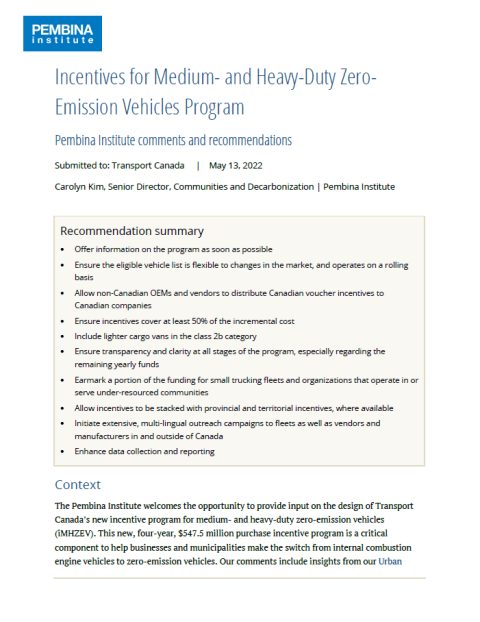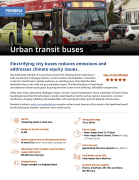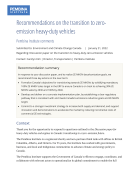The Pembina Institute welcomes the opportunity to provide input on the design of Transport Canada’s new incentive program for medium- and heavy-duty zero-emission vehicles (iMHZEV). This new, four-year, $547.5 million purchase incentive program is a critical component to help businesses and municipalities make the switch from internal combustion engine vehicles to zero-emission vehicles. Our comments include insights from our Urban Delivery Solutions Initiative, a national network of businesses and organizations working to reduce freight emissions in Canadian cities.
MHDVs are a significant contributor to Canada’s greenhouse gas emissions. Freight trucks currently account for nearly 35% of Canada’s transport sector emissions, and nearly 10% of Canada’s overall emissions. This share has grown since 1990, when these figures were at 16% and 3% respectively.
Financial incentives are crucial in reducing one of the main barriers to electric vehicle adoption: high upfront purchase prices. We are pleased to support the proposed Transport Canada incentive program as we believe this measure — along with other complementary zero-emission MHDV demand- and supply-side programs and policies, including support for charging infrastructure — will help bridge the gap and kickstart Canada’s adoption of 35% of medium- and heavy duty vehicle sales to be zero-emission by 2030.
Recommendation summary
- Offer information on the program as soon as possible
- Ensure the eligible vehicle list is flexible to changes in the market, and operates on a rolling basis
- Allow non-Canadian OEMs and vendors to distribute Canadian voucher incentives to Canadian companies
- Ensure incentives cover at least 50% of the incremental cost
- Include lighter cargo vans in the class 2b category
- Ensure transparency and clarity at all stages of the program, especially regarding the remaining yearly funds
- Earmark a portion of the funding for small trucking fleets and organizations that operate in or serve under-resourced communities
- Allow incentives to be stacked with provincial and territorial incentives, where available
- Initiate extensive, multi-lingual outreach campaigns to fleets as well as vendors and manufacturers in and outside of Canada
- Enhance data collection and reporting






